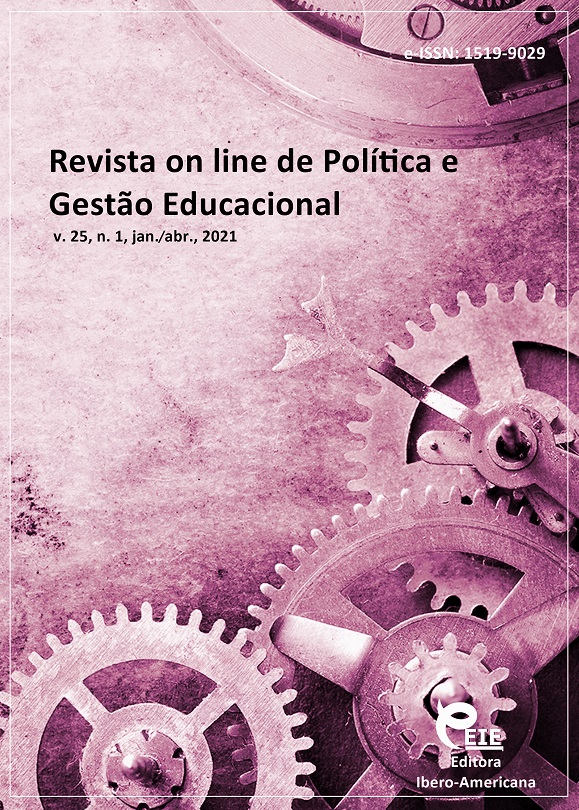To be a teacher or being a teacher: the implications in the classroom context
DOI:
https://doi.org/10.22633/rpge.v25i1.14937Keywords:
Education, Teacher, Student, Learning, PedagogyAbstract
In a context where the use of active teaching-learning methodologies, strategies and class planning linked to technology are promoted, among other meaningful tools to dispose a proper environment to develop an efficient learning, questions like why our students do not achieve their goals arise. What is necessary indeed to make the learning process efficient and allow the students to be autonomous in their learning process? The problem may not be only the student. May the teacher even having professional training to act in his/her career be prepared with orientation and academic qualification enough to bring their students methods and tools to develop the most possible improvements in the student´s learning universe? In this context, this work aims to bring up a reflection about the teaching training and education in a way to meet the demand in the current educational field, added to the pedagogical act that encourages the teacher's autonomy that he/she has to instigate in his/her students, but due to the lack of motivation and the performance of “Being teacher” cannot develop the skills that education requires.
Downloads
References
DARSIE, M. M. P.; CARVALHO, A. M. P. O início da formação do professor reflexivo. Revista da Faculdade de Educação, São Paulo, v. 22, n. 2, p. 90-108, 1996.
DIESEL, A. et al. Os princípios das metodologias ativas de ensino: uma abordagem teórica. Revista Thema, Pelotas, v. 14, n. 1, p. 268-288, 2017.
FARIA, E. T. O professor e as novas tecnologias. Ser professor, v. 4, p. 57-72, 2004.
FERRAZ, A. P. C. M.; BELHOT, R. V. Taxonomia de Bloom: revisão teórica e apresentação das adequações do instrumento para definição de objetivos instrucionais. Gest. Prod., São Carlos, v. 17, n. 2, p. 421-431, 2010. DOI: https://doi.org/10.1590/S0104-530X2010000200015
FREIRE, P. Pedagogia da autonomia: saberes necessários à prática educativa. São Paulo: Paz e Terra, 2002. 92 p.
KRATHWOHL, D. R. A revision of Bloom’s taxonomy: an overview. Theory in Practice, v. 41, n. 4, p. 212-218, 2002.
MORÁN, J. Mudando a educação com metodologias ativas. Coleção mídias contemporâneas, convergências midiáticas, educação e cidadania: aproximações jovens, v. 2, n. 1, p. 15-33, 2015.
MORIN, E. Os sete saberes necessários à educação do futuro. 3. ed. São Paulo: Cortez, Brasília, 2001.
PEREZ GÓMEZ, A. O pensamento prático do professor: a formação do professor como prático reflexivo. In: NÓVOA. A. (Coord.). Os professores e sua formação. Lisboa: Dom Quixote, 1992. p. 93-114.
RAMPINELI, E. F. Ser ou estar professor? A construção da ética no contexto escolar. Revista Linhas, Florianópolis, v. 2, n. 1, 2001.
ROCHA, T. L. Da racionalidade técnica ao professor reflexivo. Cadernos da FUCAMP, v. 13, n. 18, p. 119-127, 2014. Disponível em: http://www.fucamp.edu.br/editora/index.php/cadernos/article/download/407/306. Acesso em: 15 mar. 2021.
Downloads
Published
How to Cite
Issue
Section
License
Copyright (c) 2021 Revista on line de Política e Gestão Educacional

This work is licensed under a Creative Commons Attribution-NonCommercial-ShareAlike 4.0 International License.
Manuscritos aceitos e publicados são de propriedade da Revista on line de Política e Gestão Educacional. É vedada a submissão integral ou parcial do manuscrito a qualquer outro periódico. A responsabilidade do conteúdo dos artigos é exclusiva dos autores. É vedada a tradução para outro idioma sem a autorização escrita do Editor ouvida a Comissão Editorial Científica.










